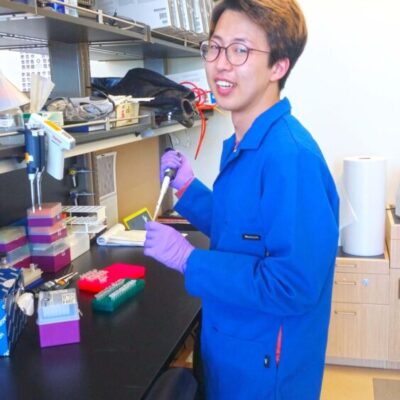Denny Cha L&S Sciences
Identification of Interactor Binding Domains on Usp44
Ubiquitin is a protein that serves as a molecular tag for either degradation of its targets by the 26S proteasomes or for a wide variety of other functions such as DNA repair, transcription, endocytosis, membrane transport, or protein localization in a proteasome independent manner by covalently attaching to its target proteins. Deubiquitinases (DUBs) are proteins that mediate ubiquitin removal and processing to play regulatory roles in multiple cellular processes. The deubiquitinase (DUB) Usp44 is a critical regulator of cell division that acts as a tumor suppressor by preventing premature anaphase during mitosis. During cell division, Usp44 protects mitotic checkpoint complex from the anaphase-promoting complex (APC)-driven disassembly, which allows it to regulate transition from metaphase to anaphase. Beside this well-known function, Usp44 may also play a significant role in regulating stem cell pluripotency and differentiation in neuronal lineages. Previous work has identified and characterized Usp44 binding partners. Most of the binding partners such as NCoR complex, WDR5, and SATB1-2 were identified to be chromatin remodelers involved in the transcriptional regulation of stem cell pluripotency and stem cell self-renewal. However, it is still not clear how Usp44 binds to its partners. To understand how Usp44 interacts with its chromatin remodelers, I propose to clone Usp44 deletion and point mutants, purify them from E.coli as recombinant proteins, and use them to perform in vitro binding studies with radiolabeled self-renewal factors. Through this research, I would like to understand the biochemical mechanism of Usp44s function in controlling stem cell differentiation.
Message To Sponsor
I am grateful to be able to conduct research experiments over the summer. I would like to thank the SURF L&S for selecting me and the Pergo Foundation for their generous financial support. My sincere gratitude also goes to my mentors Professor Rape and Dr. Mocciaro for their guidance and supports. I look forward to maximize the opportunities given to me through this fellowship.